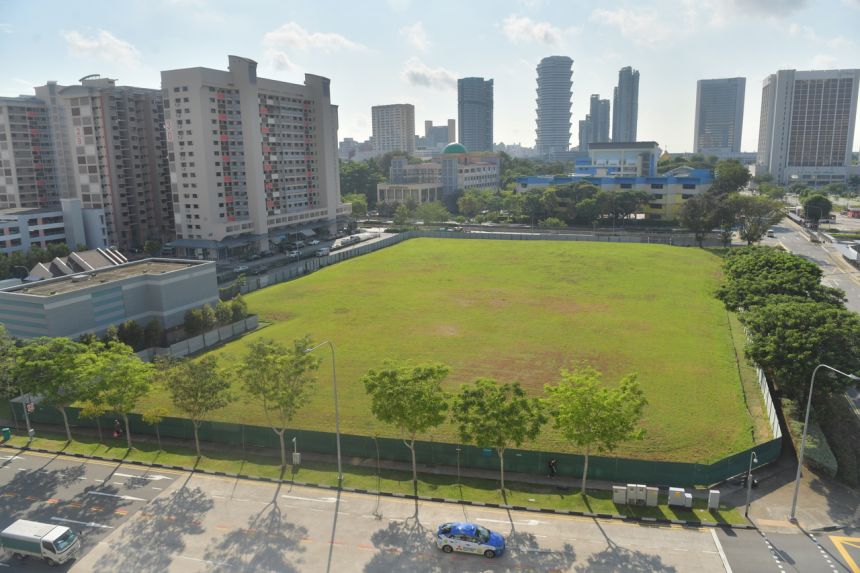
HDB will launch a new housing project in November 2021 as part of a BTO exercise in the Rochor area.ST PHOTO: ALPHONSUS CHERN
SINGAPORE – The tightened measures for future Housing Board flats in prime locations, such as a longer 10-year minimum occupation period (MOP), should help temper demand and dampen resale price increases in future, said National Development Minister Desmond Lee.
He was addressing concerns that first-time sellers of these prime flats could bump up the price of their units to account for the subsidies that HDB will claw back at the point of sale.
The recovery of additional subsidies that will be pumped in to keep new build-to-order (BTO) flats in prime areas affordable is another feature of the new prime location public housing (PLH) model announced on Wednesday (Oct 27). All subsidies will be factored into prices when the units are launched as BTO flats.
Mr Lee said it is hard to predict how exactly prices will evolve. He said: “It depends on so many factors and considerations – market considerations, buyers’ sentiments and so on.”
Speaking at the Singapore Economic Policy Forum 2021 on Friday (Oct 29), he said the Government has received “diverse feedback from all quarters” since the new model was revealed.
One of the deepest points of contention was on the additional eligibility conditions for resale buyers of PLH flats, said Mr Lee. The conditions include a $14,000 income ceiling, similar to that for BTO applicants.
Some have asked why the rules include an income ceiling, given the Government’s aim to keep prime locations inclusive.
Acknowledging this apparent paradox, Mr Lee said: “It is not our intention to exclude anyone from these prime locations. If land and resources were not the constraint, one would seek to provide for all.”
But without some intervention, Mr Lee said, resale prices would likely rise out of reach of many Singaporeans, thus excluding them from these prime location flats.
Calibrated restrictions are thus needed to keep such flats accessible to a wider group, he added.
He said there are existing HDB resale flats and private housing in prime central areas for those who do not meet the PLH eligibility conditions, which are similar to existing criteria for buying BTO flats.
This is “an objective set of means-tested conditions that Singaporeans are already familiar with”, Mr Lee said. The $14,000 income ceiling covers more than eight in 10 households.
He noted that the income ceiling does not keep out those who have low income but high wealth, such as children of well-to-do parents, or wealthy retirees.
“We considered this too, but it’s not straightforward to comprehensively means test one’s wealth or one’s family’s wealth,” said Mr Lee, who added that the BTO criteria “serve as some form of proxy for wealth”.
For instance, private property owners are not allowed to buy a PLH flat until 30 months after selling their private property, he said.
“But it’s hard to do much more in a meaningful way. We remain always open to suggestions, and we will keep studying the issue.”
On concerns from some people that the 10-year MOP – up from five for typical HDB flats – is too long and not practical because family and life circumstances may change during that period, Mr Lee noted that there were others who felt 10 years was too short.
“On balance, we thought that the longer MOP was indeed warranted – to emphasise owner-occupation and reduce speculative demand, which would be greater for flats in such good locations,” he said, adding that HDB data indicates that most people live in their flats for more than 10 years before selling them.
“There is no magic number that works for all families in all situations,” said Mr Lee.
He added that those who face extenuating circumstances during their MOP will have their appeals considered on a case-by-case basis, in a manner similar to those currently on five-year MOPs.
Mr Lee also addressed feedback that allowing PLH flat owners to only rent out rooms – and not the whole flat – diminishes their property rights.
While he said he understood such opinions, others who faced difficulties in getting flats have voiced frustration when they see HDB flats for rent as they feel that subsidised housing should not be a source of income.
To strike a balance, Mr Lee said PLH flats – which will likely fetch higher rents – should be prioritised even more for those buying a long-term home to reduce speculative demand and moderate resale prices.
“We may not be able to screen out speculative demand completely, but the 10-year MOP, and disallowing whole flat rental, will go a long way,” he said.
Firm action will be taken against people who abuse the rules by renting out their entire flat while locking up one room and pretending to still live in it, he added.
Some have done so with existing flats, renting out the entire unit before their MOPs have expired.
Flats have been taken back from owners in egregious cases, and the authorities will see how best to enforce regulations, especially for prime location flats where “the temptation to game the system may be higher”, he said.
“Source: [Tighter measures for prime HDB flats should dampen resale price increases in future: Desmond Lee] © Singapore Press Holdings Limited. Permission required for reproduction”
